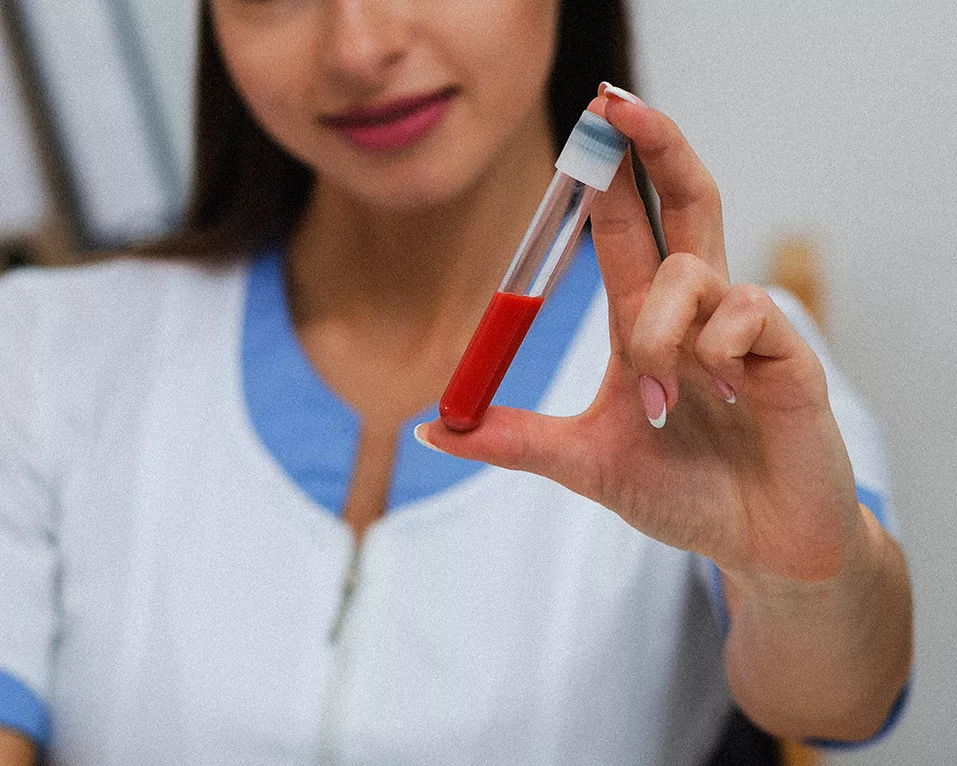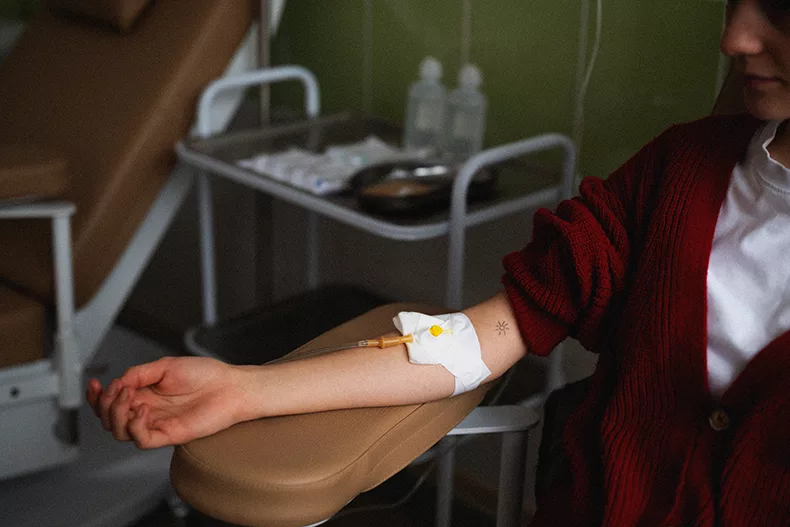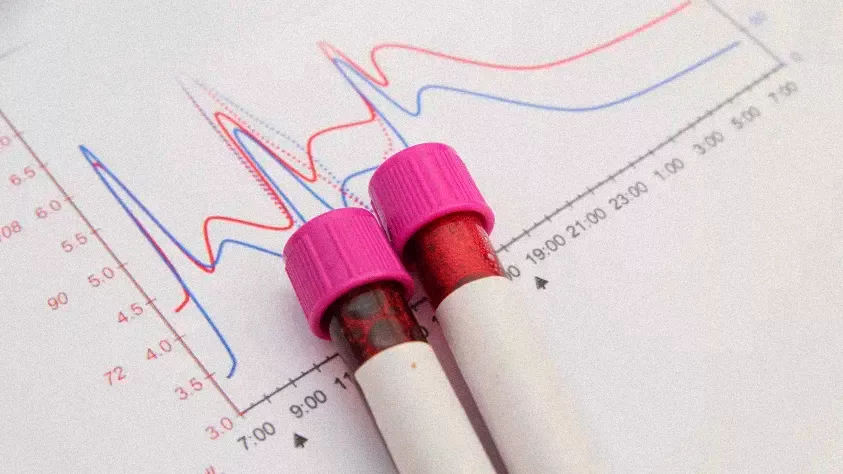Вlood test and preparation for it
Blood tests are the most important diagnostic tests that allow you to monitor your health and detect diseases at an early stage. They are extremely important because regular blood tests help you respond quickly to possible health problems. In this article, you will learn what a blood test is, how it is performed, and how to prepare for it.
Make an appointment for a blood test in Warsaw:
Contents
Highlights
- Blood tests play a crucial role in the early detection and monitoring of diseases, and their results provide valuable information about the patient's health status.
- To ensure the accuracy of the results, patients should follow the recommendations for preparing for the test, such as fasting or avoiding intense physical activity before the blood draw.
- Regular blood tests should be performed at least once a year, which will allow you to effectively monitor your health and respond to potential risks.
What is a blood test
Blood tests are basic diagnostic tests that help monitor a patient’s health. They are often used for preventive purposes to detect potential health problems at an early stage. Regular blood tests allow you to detect various diseases at an early stage and take appropriate preventive measures.
Blood test results provide valuable information about how our body functions. They can show the condition of the liver, kidneys, and cholesterol levels, which is extremely important for monitoring overall health. A blood test, one of the most commonly performed tests, examines the components of the blood, including the number of red and white blood cells, which is important for assessing overall health and vitamin levels.
Blood tests can also be used to monitor the effectiveness of treatment and adjust therapy based on the results. This diagnostic tool is invaluable in everyday medical practice as well as in the case of more complex diseases.

How blood donation works

The blood sample is usually taken on the inside of the elbow, where the vein is best accessed. The procedure is relatively quick and usually takes a few minutes, and the entire visit, including registration, takes approximately 8-10 minutes.
Before taking blood, medical staff disinfects the puncture site to minimize the risk of infection. During the procedure, a thin needle is used, which is inserted at an angle to reduce pain. The patient may experience some discomfort, but it is usually short-lived.
After the blood sampling is complete, the puncture site is cleaned and the patient may be asked to put pressure on the area to prevent bleeding. A patch or bandage is applied to the puncture site to speed up the healing process.
Although patients may experience some side effects, such as dizziness or bruising, these are usually short-lived and not a serious problem.
Preparing for a blood test
To ensure that the results of blood tests are as accurate as possible, it is important to prepare for them properly. Here are some recommendations:
- The patient should come for the examination in the morning, preferably from 7:00 to 10:00.
- It is advisable not to smoke before the examination.
- You should also refrain from physical activity before the blood test to avoid affecting the results.
Following these recommendations will help you get reliable and safe results.
Before the blood test, it is advisable to rest for 10-15 minutes in a sitting position, which will allow the body to calm down and stabilize. Some tests require that the patient fast for about 12 hours before the test, so it is important to follow these recommendations.
The patient should also tell the medical staff if they have taken any medications the day before the test. This information can be crucial for interpreting the results, as some medications can affect blood counts.
Blood sampling in children

Blood donation in children can be stressful for both young patients and their parents. Therefore, it is important for parents to remain calm, as children can sense the emotions of adults and their reactions can affect their well-being.
A few simple strategies can be helpful to reduce a child’s anxiety before a blood draw:
- Talk to your child in simple words about what is going to happen.
- Bring a favorite toy or book with you to help your child focus on something pleasant while visiting the lab.
- After the procedure, praise and encourage the child, which can improve his or her well-being and create positive associations with the procedure.After the procedure, praise and encourage the child, which can improve his or her well-being and create positive associations with the procedure.
If your child is very scared, you should consult with the medical staff, who can apply a special approach to make the procedure as stress-free as possible.
What diseases can be detected by a blood test?
Blood tests can detect many diseases, including blood disorders such as hemorrhagic diathesis, leukemia, and other cancers. They also help diagnose anemia, which is determined by hemoglobin and ferritin levels. The causes of anemia can range from iron deficiency to other factors.
Blood tests are also important for detecting bacterial and viral infections. Abnormalities in white blood cells may indicate inflammation, which is important for diagnosis. Glucose test results are important for the diagnosis of diabetes and pre-diabetic conditions, which allows for appropriate treatment and monitoring of these conditions.
Blood tests can also detect inflammatory diseases and cancer, which allows for prevention and early diagnosis. Therefore, regular blood tests are crucial for maintaining health and early detection of serious diseases.
Interpretation of blood test results

The results of a blood test are provided in the form of a report, which includes the full name of the test, its results, and the reference range corresponding to the patient’s gender and age. In the case of abnormal results, the report usually includes designations such as L (low) or H (high) to indicate an abnormality.
Blood test results provide your doctor with important information about the functioning of your internal organs. Consultation with a doctor is recommended when blood test results show values outside the reference range in order to interpret the results correctly and take further diagnostic or therapeutic steps.
Regular monitoring of blood test results and additional examinations at the diagnostic National Research and Practice Center and examination of the dog are key to assessing the health status and early detection of potential problems.
Regular blood tests - why they are important

Regular blood tests should be performed at least once a year, and the frequency may be increased depending on the patient’s condition. It is recommended to have a blood test at least once a year, regardless of the patient’s age.
Regular blood tests are extremely important for monitoring your health and help to detect diseases such as diabetes or heart disease at an early stage. They also allow you to monitor the effectiveness of treatment and adjust therapy depending on the results.
Frequently asked questions about blood donation
Before having your blood drawn, you should inform the medical staff about any medications and nutritional supplements you are taking. It is also important to fast for 8-12 hours before the blood test so that the results are as accurate as possible.
During the visit to the blood collection center, the patient may experience some symptoms, such as: in the waiting room of the blood collection center – dizziness, fainting, pain at the puncture site, bruising.
The blood collection center offers professional service, various tests, and modern interpretation of the results in context.
Limiting food intake, particularly fatty foods, and hydration, particularly fluid intake, are also key considerations before blood collection. Informing staff about medications taken and the container to be used for the collection can affect the accuracy of the results and their interpretation in the context of health status, as can slowing down the consumption of food and alcohol, including meals.
Bottom line
Thus, blood tests are one of the most important diagnostic tools in medicine. Regular examinations allow you to detect diseases at an early stage, monitor your health and adjust treatment. Do not forget that you need to prepare for the test properly and consult your doctor about the results.
We encourage you to have regular blood tests and take care of your health. A proactive approach to health can bring many benefits and peace of mind.
Frequently asked questions
To obtain more accurate test results, it is recommended to fast for 8-12 hours before blood sampling. Compliance with this rule is necessary for a more accurate diagnosis.
To avoid affecting the results of the blood test, you should inform the medical staff of all medications and supplements you are taking. Providing this information is crucial for the correct interpretation of the results.
Blood sampling usually does not cause much discomfort, most patients feel only a slight prick. It is a short and routine procedure.
Blood tests are recommended at least once a year, but this frequency can be increased if you have health problems. Regular testing helps to identify potential health problems at an early stage.
Blood tests can be taken at LUX MED centers, which also offer home blood sampling for those who find it difficult to get to the center. I recommend that you use their services.